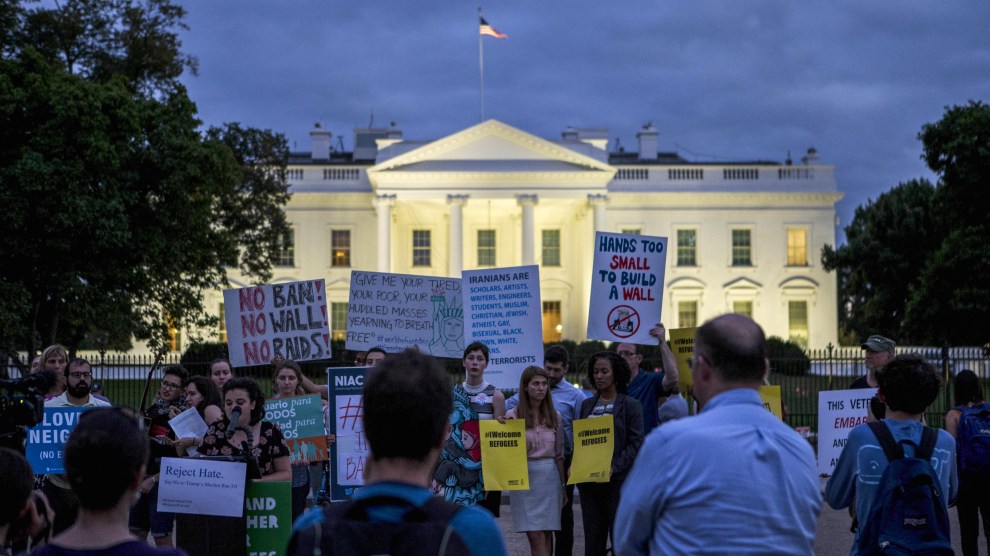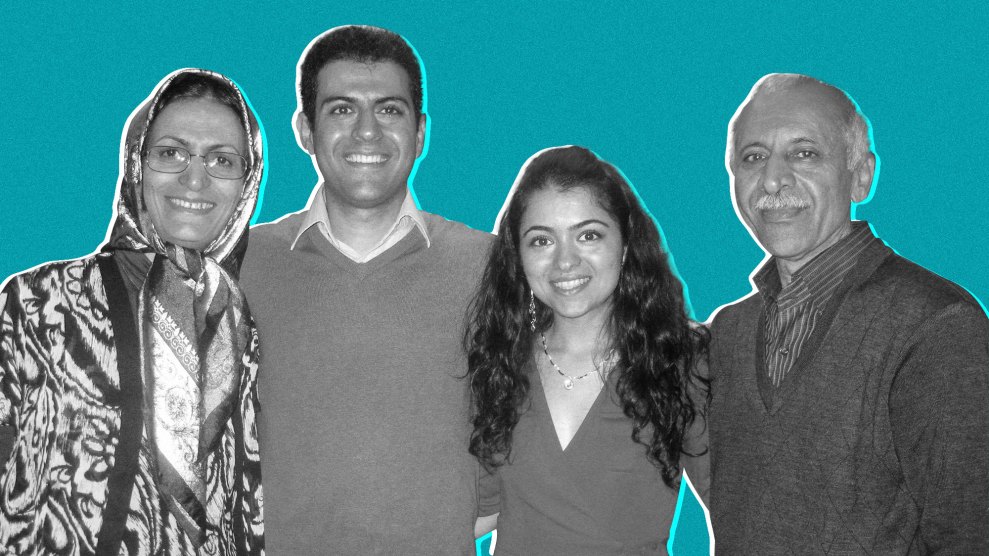
Protesters outside the North gate of the White House hold signs against President Trump's travel ban. Alex Edelman/ZUMA Wire
For the past year and a half, all Mania Aghdasi hoped for was a chance to see her father. A behavioral therapist living in Antioch, California, Aghdasi had recently lost her brother to brain cancer and desperately wanted the opportunity to grieve with her father, Zartosht. But that wasn’t easy because he lived in Iran.
Aghdasi, a US citizen, helped her father apply for a tourist visa in April 2016. After Zartosht attended his interview in October, he was told that his case would be placed in administrative processing, an additional review period not atypical for many Iranians. After three months and no word from the embassy, Aghdasi began to worry. By then, President Donald Trump had implemented an executive order banning citizens from several Muslim-majority countries, including Iran, from entering the United States. In February 2017, Aghdasi sent a letter to the US Embassy in Yerevan, Armenia, where he had interviewed, stressing that her father, at 80, was worried he may not see his daughter before the end of his life. A few days later, the embassy told her the case was still in administrative processing.
As months went by, and Trump pressed forward with a second and third version of the travel ban, Aghdasi grew increasingly depressed. She continued writing to the embassy about her father’s case. “I feel I am falling apart,” she wrote in a July email. “I feel powerless, and lonely, I don’t know where to go and who to ask for help.” But the case still lingered in administrative processing, and her father also fell into depression. As he couldn’t make it to the states, Aghdasi finally visited him in Iran late last year, and shortly after, he passed away. Aghdasi didn’t hear anything about her father’s case until two weeks after he passed, when she found out online that his case had been denied.
What Aghdasi didn’t know during this ordeal was that her father could have possibly been eligible for a waiver—one of the only ways people banned by Trump’s order can obtain a visa. Aghdasi says that if she had known that was an option, she would have tried to apply. “I’m sad because my hope is gone,” she says. “I feel like I failed as a daughter. Even though I tried.”
Since Trump ordered his first travel ban, Aghdasi’s story has become just one of so many cases in which individuals have been separated from their loved ones. Now, her story is part of a lawsuit brought by a group of Iranian nationals, US citizens, lawful permanent residents, and their family members who have been denied visas as a result of the travel ban. They’re specifically taking issue with the waiver process—a provision that was supposed to allow some individuals to enter the country on a case-by-case basis. According to the lawsuit, filed in March, the Trump administration has failed to create a regular process for issuing waivers, and rather has “issued blanket denials of visas, regardless of personal circumstances and without giving applicants the opportunity to argue their cases.” In turn, the lawsuit argues, the government is violating the Administrative Procedure Act, the Immigration and Nationality Act, and the right to due process and equal protection under the Fifth Amendment, and thus continuing to discriminate against individuals on the basis of their nationality and origin. Aghdasi’s story is one of more than 20 stories included in the suit, though she is not listed as one of the 26 plaintiffs.
“We believe the waiver process is a sham. There was never any intention to implement that part of the travel ban,” Shabnam Lotfi, one of the attorneys on the case, tells Mother Jones. “The administration has implemented the travel ban as they originally intended it to be: a flat-out, all-out ban of nationals coming to the United States from those countries.”
When the Trump administration announced its third travel ban last September, it expanded upon a provision that allowed consular officers to grant waivers to individuals from the banned countries on a limited basis. In order to be granted a waiver, the presidential proclamation explained, applicants had to prove that being barred from entering the US would cause them “undue hardship,” that they wouldn’t pose a national security or public safety threat to the US, and that their entry would be in the national interest. The proclamation also laid out certain circumstances in which waivers could be “appropriate,” including if someone is trying to visit or live with a close family member in the US, or if an individual has significant business or professional obligations in the country. While defending the ban’s constitutionality in court, the administration referred to the waiver process as a “safety valve“—a provision that showed the ban wasn’t entirely shutting off access to people from the eight countries. But lawyers and civil rights advocates say there is little evidence the process has been put into practice.
Though the president’s proclamation directed the Departments of State and Homeland Security to develop further guidance on how to process these waivers, the administration has offered little detail to visa applicants and their lawyers about how to apply. Applicants are often denied visas with no opportunity to apply for a waiver at all. Other times, applicants are told they may be eligible for a waiver, but are given no instructions for how to apply. Even in these cases, lawyers say, it’s unclear exactly what documents an applicant should submit, and to whom. According to the State Department website, there is no waiver application to fill out.
“There does not appear to be any system or process across the consulates for the waiver,” says Elica Vafaie, a staff attorney at Asian Americans Advancing Justice-Asian Law Caucus, a civil rights group based in San Francisco who has followed the issue closely. “It really feels chaotic and arbitrary.”
Between December 4, 2017, and February 15, 2018, only two waivers were granted out of more than 8,000 visa applications, according to data from the State Department. One of those two cases involved a waiver for a Syrian dancer who applied with a strong focus on the national interest criteria. Matthew Covey, a New York-based attorney who represented the dancer, argued that because the dancer was performing at a center with funding from the Ohio Arts Council, taxpayer dollars would be affected by the dancer not being able to attend. He also enlisted the help of Ohio Sen. Sherrod Brown, who sent a letter to the consulate in support of the dancer’s case. Though the dancer’s waiver was approved, the individual wasn’t able to receive a visa in time to attend the performance. Still, Covey tells Mother Jones he thinks this case could be one way forward, and a “good indicator of what a successful waiver might look like.” He noted, of course, that this was a narrow context.
The data, first reported by Reuters last month, was initially released in a February State Department letter in response to inquiries from Sens. Chris Van Hollen (D-Md.) and Jeff Flake (R-Ariz.), who had asked for more clarification over the waiver process. “The Trump Administration claims that the waiver system can be used by people who pose no threat to our country…But these facts show that system is a farce designed to hide President Trump’s true purpose,” Van Hollen said in a statement to Mother Jones. “Appellate courts have found that this is a [de facto] Muslim ban in violation of our constitution and our immigration laws, and this high refusal rate bears that out.”
A State Department official tells Mother Jones that more than 375 waivers have now been approved since the ban went into effect in December. When asked about the increase in waiver approvals since February, at which point only the two had been approved, the State Department official said so few were initially approved because “it took time for new applications to be submitted and undergo evaluation to determine if the applicant was subject to the Proclamation, and if so, might be excepted or qualify for a waiver.”
In the February letter, the State Department also shed some light on how it is currently interpreting the criteria that would make someone eligible for a waiver. But a number of aspects still remain unclear, says Diane Rish, the associate director of government relations at the American Immigration Lawyers Association, including why some applicants are told they are eligible for waivers while others are not, at what stage someone can apply for a waiver, and who is ultimately making the decision on the cases. She says that even cases in which people have strong claims, including medical emergencies, have been denied the opportunity to apply for waivers, and it’s “unpredictable” what qualifies. “Applicants and immigration attorneys are throwing arrows at a target,” Rish says.
The March suit is asking the court to retract past visa denials due to the ban and cease future denials until there are clear and transparent guidelines on the waiver process. “All we’re asking for is a fair process. Provide us with a process, a standard that people need to meet, allow them to have their case heard, and, if at the end of the day they’re denied, that’s fine,” says Lotfi. “But to deny people a chance to apply, or to have their case heard, that runs contrary to the legal principles of this nation.”
The State Department, the Department of Homeland Security, and a representative from the Office of the Director of National Intelligence tell Mother Jones they do not comment on pending litigation. The White House did not respond to a request for comment.
Other civil rights groups are also asking the Supreme Court to consider the lack of a clear waiver process when it hears oral arguments in a broader lawsuit against the ban April 25. “We know that the [waiver process] isn’t operative,” says Sima Alizadeh, an immigration attorney at the Pars Equality Center, a nonprofit that provides legal services primarily to low-income Middle Eastern and South Asian communities in the Bay Area and Los Angeles. Pars, along with other Iranian American groups, filed an amicus brief about the waiver process to the Supreme Court late last month. Two briefs from at least 13 other organizations have also noted flaws in the process.
Several of the plaintiffs listed in the lawsuit had already begun or were helping relatives with their visa applications before the latest travel ban was issued, and some were in the last stages of the process before being denied visas. Maral Tabrizi, a lawful permanent resident living in Tempe, Arizona, helped her parents, both Iranian citizens, apply for tourist visas so they could help support her during her pregnancy. Her mother’s visa was immediately approved following her interview in October 2017, but her father was placed in administrative processing. In December, both learned they were refused visas due to the travel ban, and were told they weren’t eligible to apply for waivers. Tabrizi says she was shocked by the decision, because she thought that her situation fit squarely within the waiver provisions—she was first-degree family and a lawful permanent resident. “I cried for days—and I really regretted immigrating to the US,” she says. “It’s really unfair. I understand the security order, but when there is a waiver process introduced, it should be executed correctly so innocent families aren’t separated from each other.”
Mother Jones also spoke to people who are not connected to the lawsuit, but described similar frustrations. S., a green card holder who asked to remain anonymous, applied for a visa for his wife, an Iranian citizen, two years ago. His wife attended her visa interview this January and attempted to apply for a waiver, but was given a letter stating that her visa was refused and a consular office would review her eligibility for a waiver. However, she was given no further instructions on how to submit documents to make her case. “After waiting for a long time, we don’t know what is next, and what we have to do,” says S. Although S. says he enjoys his life here and that he believes the US is a “free and very inclusive” country, he plans to wait for a year, and if he doesn’t hear back, leave and settle in a different country where he can be with his wife. “I don’t really want to go and live somewhere else,” he says. “It’s unfortunate, but it’s important for us to live together.”
Aghdasi tells me that she thinks about her father every day. “When I wake up, I imagine that my father is here,” she says. “I had lots of plans. I was going to show him my room, my garden, he can spend time with my son. I can ease his pain,” she says. “I regret that he’s not here, he’s not sitting in this chair, he’s not talking to my son. My son lost his chance to know his grandfather.”
She says she feels voiceless, and worries that she didn’t do enough. “I still have this ‘why?’ in my mind. Why didn’t they give him a visa?” she says. “My story could have had a different ending. It should have a different ending.”
















